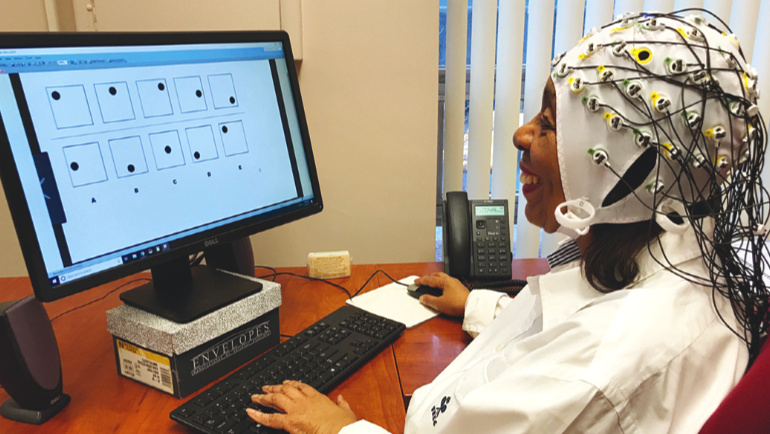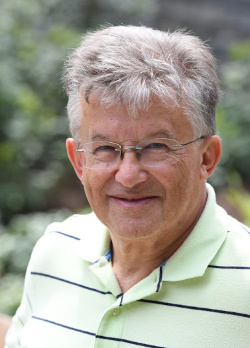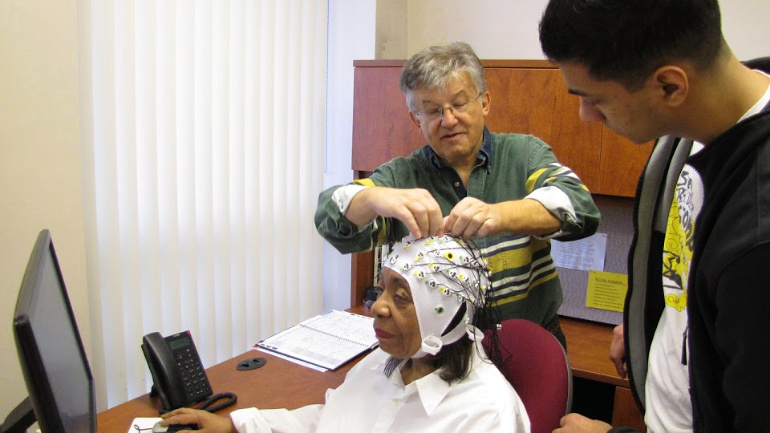
Early signs of dementia or Alzheimer’s can be hard to spot. Is forgetting your neighbor’s name normal aging or something more serious? Is it okay to take twice as long to balance your checkbook as it used to? Is your memory fog due to the stress of a recent illness or the start of a progressive deterioration?
New research at Wayne State’s Institute of Gerontology (IOG) is testing whether brainwaves could be the clue that helps distinguish serious memory loss from the occasional lapse. These brainwaves can be measured through a safe, comfortable, non-invasive skull cap that produces an electroencephalogram, or EEG. At present, only an expensive, high-tech brain scan like an MRI can detect the subtle brain changes of early Alzheimer’s or dementia. Early diagnosis of brain changes is the gold standard, giving more time for lifestyle and medical interventions to slow or perhaps one day stop the further loss of memory and function.

Dr. Voyko Kavcic, a faculty member of the IOG, heads the $3.3 million grant from the National Institutes of Health to evaluate community-based screening with EEG and also simple computer-based cognitive tests in discriminating persons with and without mild cognitive problems or even dementia. Over the next five years, his team will study 500 older African American men and women who complain of memory loss but have not been diagnosed in clinical assessments; African Americans are twice as likely to develop dementia as Caucasians.
Kavcic is collaborating with Dr. Bruno Giordani of the University of Michigan. Together, they will co-enroll all participants in the NIH-funded Alzheimer’s Disease Research Center at U-M (part of the Michigan Alzheimer’s Disease Center). This will allow all participants to receive medical and neurological screening and basic cognitive tests to confirm the diagnosis found through Voyko’s tests. This will be a double-check on whether the participant has no impairment, mild cognitive impairment or something more serious.
Recruits must be at least 65 years old, live independently — either in their own home or senior housing — in the Detroit area, and believe their memory or some other aspect of thinking isn’t working as well as it used to. The first visit, which can be done at the IOG lab or at a community setting, takes four to six hours and includes paper/pencil tests of cognitive performance and a physical and neurological exam. If tests show mild cognitive impairment, the person is sent to the U-M team for additional tests to confirm the diagnosis. Patients without impairment receive a second visit about three months later for more computerized testing and the actual EEG. They will receive a $100 gift card for completing both visits. Tests are repeated twice a year for three years.

“Our pilot study showed that older African Americans accepted the computer testing and EEG very well,” Kavcic said. “The EEG is not painful, but we do use sensors on the scalp. Thick braids can interfere with the sensors, so we try to schedule the visit during a time when braids and other tight hairstyles can be undone to accommodate the cap.”
The study’s goal is to determine which EEG and computer-based measures work best to predict the direction of brain function over three years:
- Normal to normal
- Normal to mild cognitive impairment
- Normal to dementia or Alzheimer’s
“If this approach works, we will have developed a low-cost, easy-to-administer method for early identification of persons whose memory concerns may be the earliest signs of a continued decline in memory or other cognitive areas and may continue to advance,” Kavcic said. Such an advance could buy extra years of interventions for persons at high risk of dementia.
Right now, there is no effective pharmacological treatment for dementia or Alzheimer’s. “But research has shown that a healthy lifestyle and certain cognitive training can build cognitive reserve and help strengthen the brain against dementia,” Kavcic said. “If you have two persons with mild cognitive impairment, the one with a stronger, more conditioned brain is likely to live longer without impairment that affects daily functioning.”
If you would like to volunteer for this study or learn more, contact Kavcic’s research lab at 313-577-1692 or email voyko@wayne.edu. Participants must be African American, at least 65 and believe their memory is failing although they have no diagnosis of memory problems from a health care provider.
